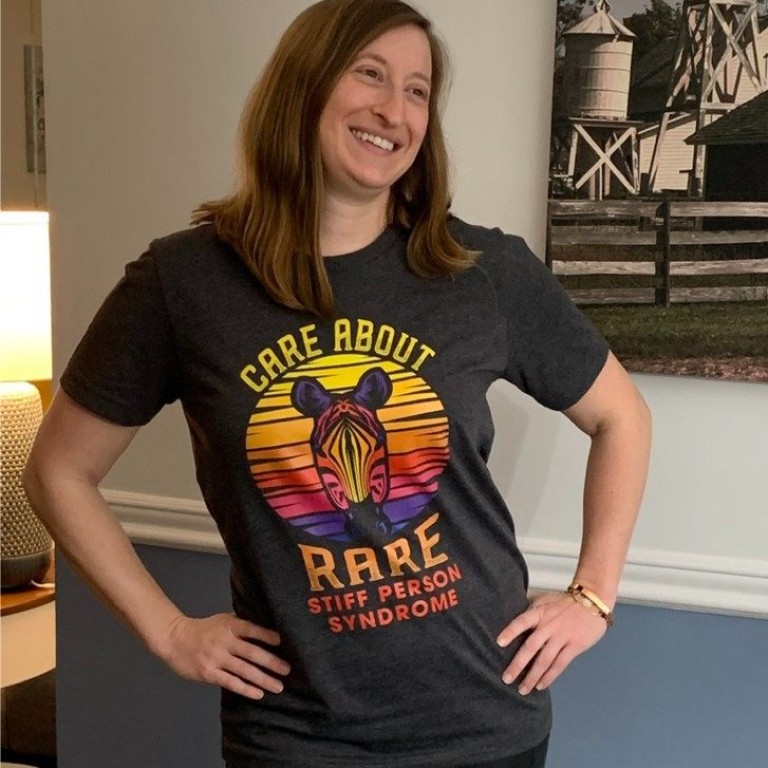
Celine Dion’s rare disease diagnosis sheds light on stiff person syndrome; meet a woman who has had it for years
- ‘It’s extremely challenging to deal with the constant pain, isolation, lack of awareness, people not understanding,’ says woman with little-known autoimmune disease
- ‘She looked scared to me and I know what that feels like,’ said Lauren McDermott on seeing Dion’s Instagram post describing the spasms and pain
Lauren McDermott has a rare neurological condition called stiff person syndrome.
Since she was diagnosed in 2019, she has had to explain her illness, which causes her muscles to spasm painfully for prolonged periods, to almost everyone – even many of the doctors who evaluated her. It is an exhausting process that adds a layer of difficulty to her disability.
On Instagram, Dion said that she has been struggling with her health for a long time. She has been having muscle spasms and pain, which her care team recently attributed to stiff person syndrome.
“Unfortunately, the spasms affect every aspect of my daily life, sometimes causing difficulties when I walk and not allowing me to use my vocal cords to sing the way I’m used to,” she said.
Watching the video of Dion reminded McDermott of the day she learned her diagnosis. “She looked scared to me and I know what that feels like.”
Graduate’s battle with ill health earns her Spirit of Hong Kong Awards nod
Stiff person syndrome (SPS) is an autoimmune disease, meaning that the immune system causes it, explains Marinos Dalakas, chief of neuromuscular medicine at Thomas Jefferson University – a private research university in Philadelphia, in the US state of Pennsylvania – and a leading researcher on the rare condition.
Each muscle in the body has an opposing muscle and when one contracts, the other relaxes. With SPS, both muscles contract simultaneously and stay tense for prolonged periods, Dalakas said.
For example, both the abdomen and back muscles could contract, causing someone to “become like a statue”. The spasms can impact any muscle.
“We don’t know why some people get it and others don’t,” he said.

Patients are often treated with a combination of medication to reduce muscle tension and stress. Treatments such as intravenous immunoglobulin (IVIG) – antibodies delivered through a vein – attempt to counter the underlying autoimmune issue. The level of response to treatment varies.
The disease is rare, though Dalakas thinks the true rate is higher than one in a million, as is commonly reported.
China’s ‘folded man’ finds happiness and hope after life-changing surgery
McDermott’s path to a diagnosis started nearly a decade ago. She was in her early 30s, worked in real estate and hit the gym a few times a week.
Her neck and upper body started to feel tense after workouts, which she attributed to ageing. She needed massages every other week. But soon that was not helping, and the massages became painful. The only thing that provided some relief were heating pads.

In a matter of years, she went from curling 20 pounds (9kg) with each bicep to struggling to pick up a two-pound dumbbell.
“It’s extremely painful. The joints were hurting,” McDermott said. “It’s like the body didn’t even want to move.”
That summer, things took a turn for the worse. Working became nearly impossible. Her entire body hurt. One day, she woke up and her right arm would not move at all.
Go with your gut: anti-inflammatory diet can tame autoimmune ills
That year, she was diagnosed at Penn Medicine, a renowned academic medical centre in Philadelphia, Pennsylvania. She went to Thomas Jefferson University Hospital for a second opinion from Dalakas, who has since managed her care.
When she got the official diagnosis, she was with her mother. They both started crying.
“She said ‘I don’t want you to have this’ and I said ‘I don’t want to have this’,” McDermott recalls.

Now 41, McDermott is on disability, unable to work. She never knows when the next spasm will hit, force her to stay in bed in pain and leave her exhausted the following day.
She has to cancel the vast majority of the social plans that she makes. She gets three consecutive days of IV treatment every four weeks, among many other treatments.
“It’s extremely challenging to deal with the constant pain, isolation, lack of awareness, people not understanding, people not knowing how to accommodate,” McDermott said.

She does not want to share her entire medical file with every person she meets but she feels like she has to. In every appointment, whether with her gynaecologist or primary care doctor, she brings up stiff person syndrome and makes a point of educating everyone in the room. Many tell her they have not heard of it.
Now, with Dion’s disclosure, McDermott hopes that maybe that will change.
“It’s gonna be a journey [for her] but I’m hoping that with the awareness she can bring, and hopefully she continues to do that … more people will know,” she said.

